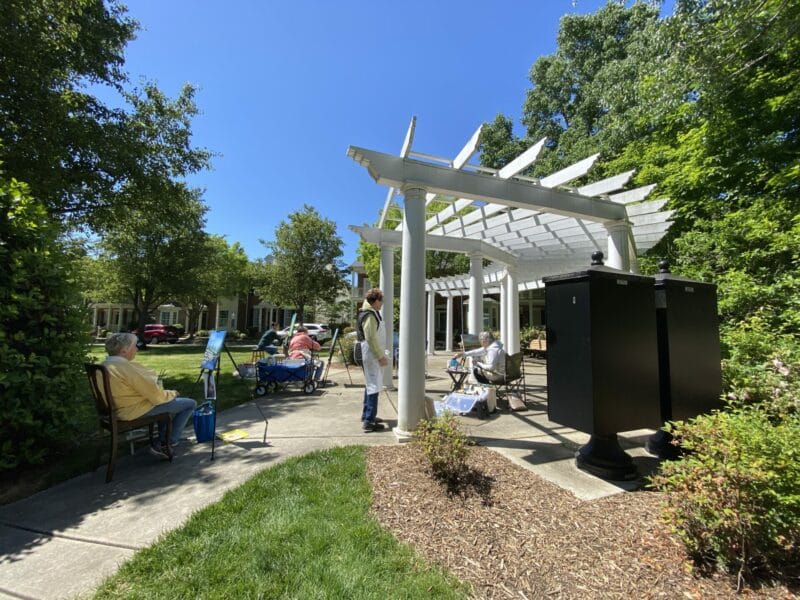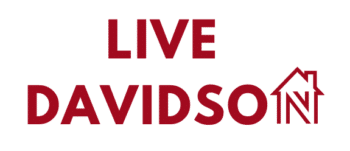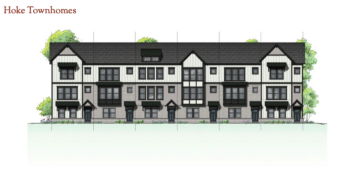NEWS
Affordable Housing in Davidson

The St. Alban’s neighborhood is one of several communities in Davidson that include affordable housing.
As the Town launches the Affordable Housing Plan survey, the News of Davidson team thought it might be helpful to consolidate some historical info about affordable housing in Davidson. If you don’t already know about the important history Affordable Housing has in our town, we hope you will read about some of the history before you complete the survey.

The Affordable Housing Plan survey will be available until March 7.
Back in 1994, we in Davidson felt that we were at the edge of a precipice. We no longer lived in a sleepy and undiscovered village—growth was upon us and we could not continue to function with our old zoning codes. So, we stopped the action for a year with a moratorium on building throughout the whole town and stepped away from doing things the old way. We did not know where the new thinking would take us, but we had to try for something different, or the growth would prevent us from continuing to look and act like ourselves.
Davidson Faces Growth
The first step was to determine what it actually meant to “look like ourselves.” The citizens of Davidson most feared losing our sense of community, that strong feeling of place we have around the Downtown, the Village Green, and the Campus. We wanted our streets to remain narrow and slow, with plenty of sidewalks and trees. We wanted our open space somehow spared, at least in part, from the ax and the bulldozer. We wanted recreational opportunities for all age groups, with more parks and gathering spaces.
Diversity Threatened
And we especially worried that we would no longer be what we had long been, a small town with a diverse population. Even with the effects of growth, people of diverse economic and racial backgrounds and of various ages remained in Davidson. Again and again, the question arose – how could we protect that diversity?
A New Land Plan
In 1994 and 1995, the Land Planning Task Force met to create a new method of planning in Davidson. After methodically working our way through the thorny dilemmas of managing growth, we finally realized that protecting our diversity was equally as challenging. Davidson’s traditional mix of housing was threatened by rapid development and skyrocketing property values in the region. In the summer of 1995, a newly appointed Affordable Housing Committee took up the questions: If we created more affordable housing, could we keep our diversity? Would diversity of housing mean diversity of people?
With affordable housing achieving greater and greater community support, members of the Town Board were confronted by a startling fact in the late 90s. Between January 1998 and September 1999, there were 217 new single-family dwelling permits issued in the town of Davidson, with 78% of those houses valued at over $150,000, and nearly 96% valued at greater than $100,000 (Source: Town of Davidson Records). The Town Commissioners realized that this escalation in value forced out lower income residents and that even more had to be done “officially” to protect Davidson’s small-town character. Davidson would not be able to create enough affordable housing with the work of the housing organizations alone.
The Ordinance
In 2001 the Town passed a planning ordinance that augmented the 1995 plan and described its guiding philosophy in more detail. In the “General Principles” section of the ordinance, it stated:
“We must preserve our diversity of people. Having diverse groups of people in Davidson—all ages, all economic levels, all races and ethnic groups—has long been a major contributor to our Village. To preserve this diversity, this ordinance provides for a mixture of housing types and prices, since it is the one-product housing type that kills diversity. The ordinance also provides for a mix of housing types to exist in every neighborhood. The town will actively discourage development that is predicated on having only people of similar socio-economic status living together.”
Fair Share Housing
Based on this belief, in 2001 the Town mandated that 12.5% of all new residential development in Davidson be built and sold in the affordable range. In 2006, the Town passed changes to the ordinance’s affordable requirements (Section 6.3), to make them more detailed and comprehensive.
Who Would Live in this Housing?
Town staff, service workers, College staff, teachers, police officers, and many others who make Davidson special were having increased difficulty living here because of escalating housing costs. Our Fair Share Housing Ordinance was designed to give them renewed possibilities of building a life and raising their families in Davidson. We need them.
Though we no longer can mandate that affordable housing be a part of every new development, the town does still require a payment-in-lieu from builders, if they choose not to have affordable housing in their developments.
Further Codifying the Importance of Affordable Housing
In 2020, the Town hired Eugene Bradley to serve as the first Affordable Housing and Equity Director. The Town Attorney had previously served as the Affordable Housing Director. In addition to hiring Bradley, the Town formally established the Affordable Housing and Equity Board as one of the standing, appointed boards comprising Davidson residents.
“The role of the Affordable Housing and Equity Board is to provide support, advice, and recommendations to town staff on any and all issues surrounding affordable housing, as well as the town’s racial equity work. The Affordable Housing and Equity Board will help guide the town’s work on affordable housing and equity and inclusion, providing input and guidance for the town board’s strategic objective to prioritize equity and inclusion and create a culture of belonging, address past inequities, and treat everyone with respect and dignity.” (from Town website)
Examples of Affordable Housing Are All Around Davidson
Harbour Place – Townhouses
In an urban area at Davidson’s Interstate Exit, off I-77, we have created a walkable neighborhood, called Harbour Place.
In sight of an interstate with over 100,000 cars driving along it each day, it is an unlikely place for community, but one exists there, nonetheless.
Interstate exit development presents a unique challenge for municipalities. The transient nature of the interstate lends itself to auto-oriented businesses, drive-through’s, and traffic congestion.
Davidson broke the stranglehold of typical highway exit development and created a new design standard by extending the community’s closely held values of smart growth, pedestrian-oriented development, and affordability to I-77’s Exit 30. This thriving mixed-use neighborhood is the result of establishing and following a community ethic for the way we want to live.
Habitat Houses
For over four decades, Habitat has been working in North Mecklenburg, organized by Our Towns Habitat. Their model of “sweat-equity” building relies on the homeowners participating in building houses before their houses are started, and Habitat receives funding from the federal and local governments, as well as private fundraising. Houses are typically built on a house-by-house basis, as well as sometimes on a Habitat street of homes, making use of volunteer and professional builders.
St. Alban’s Neighborhood – Townhouses
Developer Doug Boone wanted the St. Alban’s neighborhood to include affordable housing. He included affordable townhomes in the neighborhood that consists of townhomes and single family houses. As with other places around Davidson, the affordable units are blended into the neighborhood, and are a part of the Davidson Housing Coalition’s land lease program.
Deer Park – Single Family Houses
Deer Park is a mixed-use, mixed-income community that includes condominiums, a business park, retail space, restaurants, an 11-acre public park, a walking trail around Lake Davidson, and a single-family neighborhood.
It includes 48 homes, ten of which were developed and sold by the Davidson Housing Coalition in partnership with local builders, using the land lease model and interspersed throughout the neighborhood.
Through creative financing, partner commitments, and several local initiatives, the Davidson Housing Coalition homes were sold initially at $90,000 or less, to income-eligible homebuyers. The other 38 homes initially ranged in price between $113k and $145k. There are no income-eligibility guidelines to buy those 38 market rate homes.
The affordable homes fit seamlessly into the neighborhood.
The Bungalows – Affordable Rental
The North Carolina Housing Finance Agency (NCHFA) selected the Bungalows for tax credit funding and the Davidson Housing Coalition broke ground in September 1999. The ribbon cutting was in November 2000, and the units have been fully rented since he first month by people who make 50% or less of Area Median Income (AMI). This is the category that the federal government defines as “lowest income.”
In October 2001, the North Carolina Housing Finance Agency named The Bungalows as “Multi-Family Housing of the Year” in the small-town category. In March 2002, Davidson joined Boston, San Francisco, and three other municipalities as the Fannie Mae Foundation named The Bungalows a winner of the Maxwell Award for excellence in affordable housing.
Frequently Asked Questions
What does “affordable” mean?
In Davidson, we used HUD guidelines based on income ranges adjusted for family size. HUD uses Area Median Income (AMI) as determined by county and establishes four people as the base family size. Any family earning 80% or less of AMI is defined as low income. Any family earning 50% or less of AMI is defined as very low income. Every person under or above the base family size of four causes an 8% adjustment in income. For example, if the AMI were $50,000, then a family of four making $40,000 per year would be considered low income. A family of five making $43,200 (8% more than $40,000) would also be low income. A house or unit is defined as affordable in Davidson if a low-income family would not be spending more than 23% of its gross monthly income on housing costs, for rent or house payment.
Does the Town offer incentives to developers?
The Town has a form-based planning ordinance, as opposed to a by-right ordinance, so we do not offer developers incentives. We have no density caps in our village infill, which means that we do not dictate the number of units that can be built; the land does that. We have design criteria, like sidewalks on both sides of the street and planting strips for trees, and we believe that the requirement for affordable housing falls naturally in those criteria. The developer establishes the total number of units, which determines the number of affordable units, 12.5%. Or developers can choose the payment-in-lieu option.
The goal is to achieve walkable, liveable neighborhoods, built with good materials and designed for human consumption. The form-based code identifies key features that enhance sustainability, such as front porches and street-side front entrances, as well as a variety of lot sizes. The code specifies that only 50% of the lots in any neighborhood can be the same size, creating a variety of housing types. Consequently, the affordable element is just one housing type, and is not dominated by only larger homes; it is easy to integrate into the fabric of the community.
Do you use a land lease or deed restrictions to insure future affordability?
Yes, both. We allow private developers to choose either method. Many have used deed restrictions, and the Town created a sample for them to use to ensure it met our criteria. The Davidson Housing Coalition uses the land lease as a way to protect long-term affordability of a home. Many houses in Davidson were affordable upon first sale, but market pressures pushed their value out of the affordable range for future sales. In response, DHC created its land lease model, retaining title to the land, while selling only the house. The DHC Land Lease reduces initial housing costs by 25-30% and allows the family to share in property appreciation and build equity. Through retaining title to the land, DHC maintains a long-term interest in the property, which ensures it can be resold at an affordable price.
Does the community support this program?
Yes, but it requires that we continually educate our citizens about the rationale behind the program and ease their misconceptions about what “affordable” means. When we embarked on this effort in 1995, the Town Board held this as a shared belief, so all of our political energy could be spent in crafting a successful ordinance, rather than arguing among ourselves about the concept. Now, because the housing is so nicely built and integrated into our community, many citizens share in this belief.
The Town maintains this program by using the three-legged stool approach: The Town Board mandates it and gives it authority; the Staff performs the research and establishes operational objectives, such as deed restrictions, contract review, marketing; quality control, and working with developers; the Davidson Housing Coalition provides the land trust alternative to ownership, builds rental units and single-family houses, and prepares clients for financial success. Habitat builds houses, using its “sweat equity” method on a house-by-house basis.

An artist rendering of the future Hoke Townhomes.
How do you prepare people for financial stability and home ownership?
The Town partners with the Davidson Housing Coalition which has highly trained housing counselors. DHC conducts a detailed course on the elements of successful home ownership and does one-on-one counseling at no charge for anyone who wishes to gain control over finances and establish a budget. DHC also accompanies clients to banks to help them seek standard mortgage products and to protect the clients’ interests.
On a recent project the partnership included the Davidson Community Foundation as well as DHC. The Hoke Property Townhome development will include eught affordable townhomes.
More information is available on the Town’s Affordable Housing web page.
Marguerite Williams
Marguerite (Margo) Williams is a novelist ("Madame President"), editor, and business owner of A Way With Words. She has lived in Davidson since 1977. Visit her at her website.


